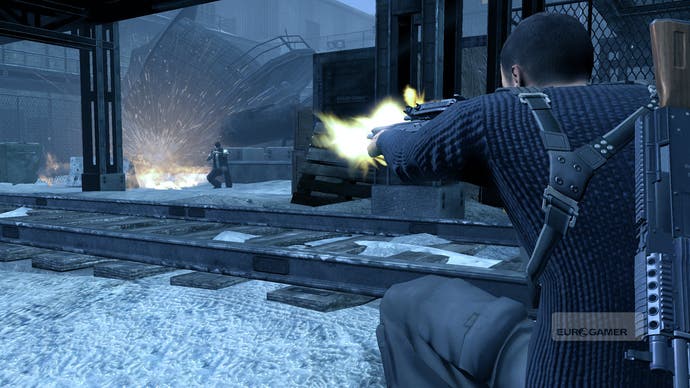Alpha Protocol
007/10?
You won't be consistently happy, however. More than with almost any other RPG I can remember, your experiences at the two-hour and the eight-hour mark will be noticeably different with Alpha Protocol. While the plot moves very swiftly, this is a slow burn as an action game, and it delivers little enjoyment in the first few missions as you get to grips with initially-overpowered enemies and the fact that the whole experience is sorely lacking in polish.
Instead of moving from one charismatic chunk of espionage mayhem to the next, you'll have plenty of time to fixate on all the little - and not so little - things that don't feel right: the arthritic cover system, the poor animation and even poorer enemy AI, and the horrible mini-games that erupt whenever you want to poke around the outskirts of a level, turn off an alarm, or open a particularly important door. Too often, Alpha Protocol feels like a B-team effort, as you fumble with problems that have already been solved in other, glossier games, and learn to make use of mechanics that have already been refined by other developers.
At the eight-hour mark, if you've persevered, you may well have had time to come to terms with all that. If you accept Alpha Protocol as a project made by a plucky team working to a faintly cruel budget, it's surprisingly hard not to get behind it.

While the shooting's ordinary and the melee combat is even less distinguished, Obsidian has really excelled in certain areas, in smart ideas like holding back character class choices until you've tried out the first mission, or in the way it uses a range of colour palettes to create distinctions between the parts of the world you're exploring. A crate in Saudi Arabia may be very similar to a crate in Moscow - I've checked and everything - but the dusty orange light of the Gulf and the frigid blues and purples of Eastern Europe make you feel like you're really travelling the globe.
Equally, the levels you play through manage to temper linearity with just enough flexibility in terms of how you move through them, and there are often multiple routes and different approaches depending on whether you're a stealthy creature of the shadows or a heavy-booted nose-pulper who trips alarms out of sheer love of the game.
While standard enemies tend to be drab, the boss battles offer sudden blasts of deranged colour, whether you're taking on an eighties-obsessed Russian crime punk who can blind you with the light display on his custom-made disco floor (not joking) or a frosty German lady-monster who gives you a sense of what Girls Aloud might have looked like if they were managed by Saddam Hussein. It's not Metal Gear Solid by any means, but it makes a nice change all the same.








